17 simple ways to save money on driving
Lucky enough to have a car as a student? You'll know just how expensive driving can be, so let us show you how to cut the cost and save money as a driver.
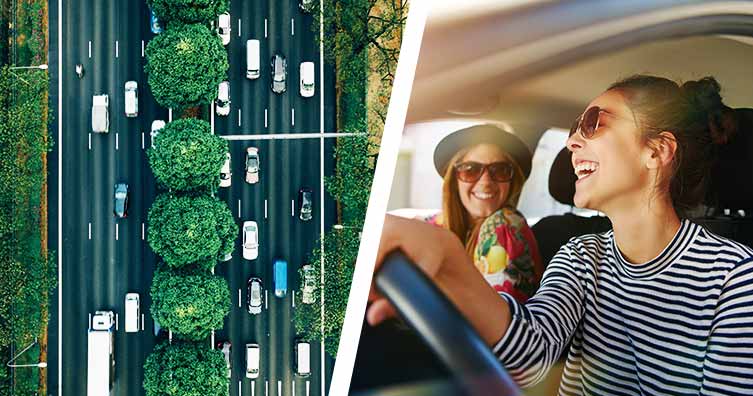
Credit: Flamingo Images (right) – Shutterstock
When your main source of income is your Student Loan (and maybe a part-time job to supplement that), it can be a massive drain on your finances to run a car as a student.
The unfortunate truth is that depending on where you live and if you're having to commute to uni, having a car can be a necessary expense that's hard to avoid. Especially with petrol prices as high as they are today.
Thankfully, there are loads of ways you can save money on petrol and cut down on your monthly motor outgoings. In fact, studies have even found you can save upwards of 30% on fuel costs if you make a few small changes to your driving habits. So, read on for top tips to reduce your driving costs...
How to cut the cost of owning a car
Here are the best ways to save money on petrol and owning a car:
-
Find the cheapest petrol near you
Perhaps the most obvious way to cut down on costs is to make sure the petrol you buy is cheaper in the first place. Petrol prices are incredibly high right now, but saving a few pennies per litre can add up quickly.
PetrolPrices.com is a free website (with an app, too) that locates the cheapest petrol and diesel in your area. But don't drive too far out of your way to get a good deal, as the extra fuel you use could wipe out any savings.
You should also avoid filling up on main roads or motorways. Price reviews have consistently found these garages to be more expensive.
Some petrol stations will offer a range of deals and loyalty schemes. For example, Tesco often runs promotional offers whereby a certain spend in-store will get you a discount (usually around 5p per litre) at one of their petrol stations.
Most fuel brands have loyalty cards too, so make sure to sign yourself up. While you shouldn't go to a more expensive station just to use a loyalty card, it's a good idea to have as many cards as you possibly can. They are free to get and could really help you cut down the cost of buying petrol or diesel.
-
Drive slowly and consistently
You might think it's more fun to drive fast, but it'll actually cost you a lot more money. Not to mention that going over the speed limit is also dangerous, illegal and could see you fined too!
Driving at 80mph rather than 70mph can use up to 25% more petrol, while it uses up to 9% more fuel to drive at 70mph than at 60mph.
Maintaining a more consistent speed rather than constantly speeding up and decelerating also saves on petrol consumption. Plus, it's a lot less annoying for everyone around you.
-
Keep your car tyres inflated
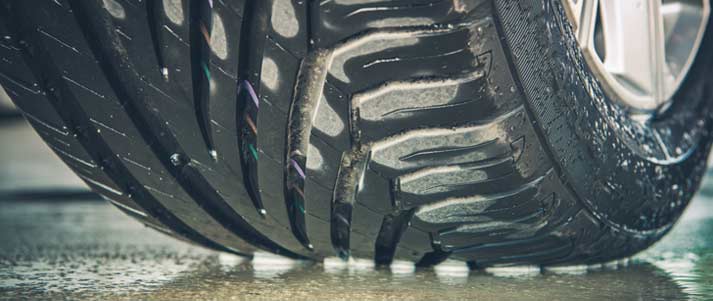
Having low tyre pressure increases 'drag' (it's a physics thing – please don't ask us to explain, because we can't). This causes your car to use up more fuel and, perhaps more importantly, is pretty dangerous.
By making sure your tyres are inflated to the recommended pressure (you'll find this in the user manual or the display on the inside of your car door), you can save yourself about 3% on fuel costs.
Believe it or not, air isn't always free. Some petrol stations will charge a fee for tyre inflation, so make sure you suss out where to fill up beforehand. You don't want to waste money getting your tyres filled if you could get it done for free elsewhere.
-
Improve your gear changes
We know you've probably got the whole gear thing down, having passed your driving test and all... But did you know that changing your gear sooner than feels natural will help cut your petrol costs even more?
Don't labour your engine. As a rough guide, try to stay under 3,000 revs and everything will be just dandy.
-
Don't excessively use your brakes
While we definitely wouldn't advise you to avoid using your brakes, be aware that overusing them can increase fuel consumption. Staying a safe distance from the driver in front and anticipating a junction means you can ease off the accelerator, rather than slam on the brakes.
You should also avoid aggressively braking at speed bumps. Braking hard, then accelerating quickly over speed bumps, uses up a lot of petrol. Try to maintain a steady 15mph – 20mph over speed bumps. Not only will it improve your fuel economy, but it'll feel a lot smoother too.
-
Avoid getting fined
This might sound pretty obvious as of course you want to avoid getting fined. But there are a few small things you might forget about that can put you at risk of getting a driving-related charge.
For example, you're legally obliged to renew your licence every 10 years, regardless of how little your appearance has changed in that time.
Keep an eye on the expiry date of your photo card licence. If you drive with an expired card, you could end up with a £1,000 fine. And with cheap passport pictures readily available, you've really got no excuse.
Also, bear in mind that you'll need to update your licence (for free!) every time you change address.
Got a parking ticket? Reckon you didn't deserve it? Find out how to appeal your parking fine. -
Pay your car tax annually
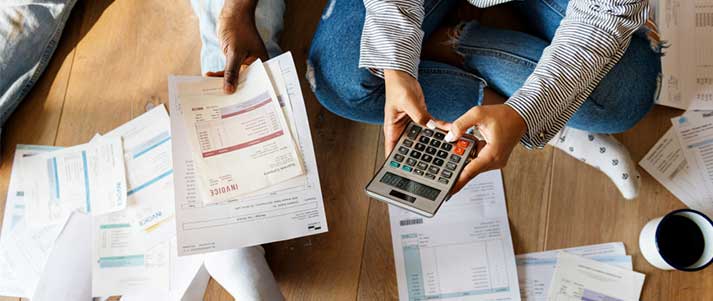
There are a few different payment options available for your car tax, and some are cheaper than others.
If you choose to pay by Direct Debit every six months or monthly, you'll usually incur a surcharge. Paying by Direct Debit annually is the cheapest option.
But don't panic if you personally can't afford to pay it all in one lump sum. See if your parents are willing and able to pay it for you. You can then pay them back in monthly instalments (without the surcharge).
Obviously, this option won't suit everyone. But if you put it to your parents that you're making a financially savvy move in order to avoid the extra fees, they might be willing to help you out.
-
Aim for cheaper MOT checks
As you may or may not know, the law requires you to get your car MOT'd three years after registration (four if you live in Northern Ireland) and then each year after that. MOTs can be very financially painful, or completely pain-free, depending on how you treat your car.
To minimise the potential financial hit, give your car a once-over before you take it in to see if there's any damage that you can fix yourself. But if you're not confident you can actually fix it, don't bother. Even the smallest issues can cause you to fail your MOT, meaning you could have to pay to have it redone.
It's also true that some garages offering MOTs may say you need work done, while others will say you've passed. It could all depend on if they're having a quiet day, or if they need the extra business.
Your best option is to take your car to a smaller, council-run MOT centre that doesn't do any in-house repairs. As they don't benefit from squeezing extra money out of you, they're more likely to be honest when telling you what condition your car is in.
-
De-clutter your car
Yes, we know we sound like your parents on this one. But having a car that doubles as a bin isn't only pretty gross, it also adds unnecessary weight. And that means you'll be wasting money on petrol when driving it around.
Fuel efficiency is reduced by up to 2% for every extra 45kg you carry. That may be enough motivation to give your car a spring clean and empty out any unnecessary rubbish as soon as you can.
If your car has a roof rack, it's also a good idea to unscrew it when it's not in use, as even that can add to the weight your car is carrying.
Did you know you can make money as a Pokémon taxi driver? Yes, really! Find out more in our guide to making money from Pokémon Go. -
Find the best car insurance policy
As our complete guide to spending less on your car insurance explains, it's really easy to end up in a situation where you're paying way too much for insurance cover.
For young people, in particular, car insurance is notoriously expensive. But choosing an alternative policy like Pay as You Drive (PAYD) could knock hundreds off your payments.
It's worth looking for insurance policies that involve having a black box fitted to your car. This will measure how and when you drive. It could help to reduce your student car insurance premium.
You can also take a look at downloading the DriveScore app. It works similarly to a black box, where the app tracks your driving and gives you a score out of 1,000. You can then decide to share this information with insurance companies for a cheaper quote. Not all insurance companies will accept it, though, but it's worth a try if you're a careful driver.
Also, don't forget to take out some decent car breakdown cover. Otherwise, you'll be shelling out big bucks should disaster strike.
Just make sure you thoroughly read both of our guides on these subjects before taking out any policies.
-
Avoid driving with an empty or full petrol tank
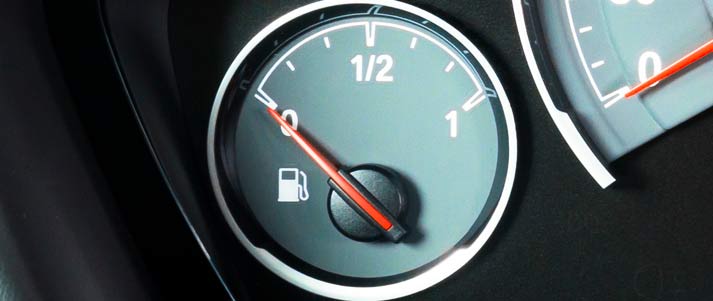
For many student drivers, it can feel like a skill to see how far you can get with your petrol gauge in the red. And filling up your car can be quite painful for your bank account when looking at the current petrol prices. But, unsurprisingly, it's not the best idea.
Driving with a small amount of fuel in the tank causes it to run out even quicker, and that's never a good thing (let's hope you have breakdown cover).
It can also cause damage to your car's fuel pump. When fuel is low, the pump will have to work far harder to access petrol from the tank, potentially sucking up bits of shrapnel and dirt in the process.
Similarly, don't fill your tank right up to the top if you can help it. Fuel is heavy, so the more you have the more you'll burn. Stick to a half- or three-quarter-full tank and your car will run much more efficiently.
Save even more money on driving by... not driving. Check out our guide to cheap ways to buy and repair a bike for more tips. -
Switch between using A/C and opening windows
It's the classic catch-22: using your air conditioning (if your car is flash enough to have it) can use up to 10% of your fuel. But, equally, having your windows open will increase the drag on your car and do some serious harm to your fuel economy.
If you really can't handle sweating it out, the best method is to use your AC when you're driving at high speeds and open the windows at low speeds.
-
Claim compensation for pothole damage
If you've been unlucky enough to experience damage to your car due to potholes in the road, don't fret. You don't have to lose your no-claims bonus to pay for this.
You'll be owed compensation by whoever is responsible for maintaining the roads, which varies depending on where you are and how big the road is. This official government page tells you exactly who you need to contact to claim for your pothole damage.
If the pothole you hit is more than 40mm deep, you've got a strong case to make a claim. If it's less than that, you can still claim but it might be a bit harder to fight your case.
Note that in order to get them to cough up the cash, you'll need photographic proof of the pothole, plus written proof from a mechanic to show that the damage was definitely caused by a pothole.
-
Prevent petrol evaporation
We hate to be the bearer of bad news, but petrol can actually evaporate right out of the tank.
To prevent this from happening, ensure your petrol cap is screwed on tight and park in the shade when possible. Petrol evaporates more quickly when warm. Nice fact for you, there.
You can save a lot of money by buying a used car instead of a brand-new one. Our guide on how to buy a second-hand car can help. -
Avoid traffic jams
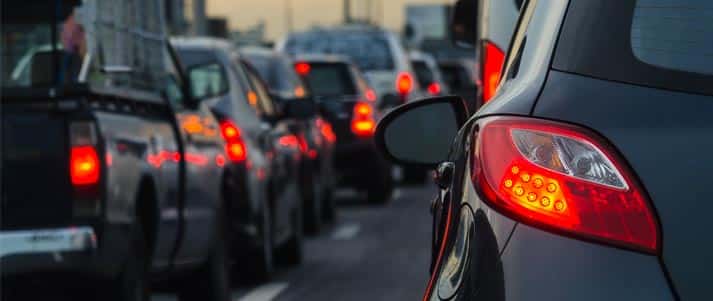
Credit: All About Space – Shutterstock
We're sure avoiding traffic jams is something you do already, for your sanity more than anything else. But, to add insult to injury, a small car with an idling engine in a traffic jam can use up to a litre of petrol in 60 minutes.
To save money and time, try to avoid congestion by planning ahead and avoiding rush hour times and busy roads.
You'll sometimes find that using A and B roads will get you to your destination faster as they're more likely to be free of traffic jams. Plus, the lack of traffic means you'll brake less and use your fuel more efficiently. This will help you cut costs in the process.
If you do get stuck in traffic and think you'll be stationary for more than two minutes, turn the engine off.
-
Join car clubs
If you don't need to drive regularly, then it's definitely worth considering joining a car club instead of forking out cash to run your own wheels. You could even make some extra dough by renting out your private parking space.
Car clubs allow you to pay a membership fee in order to gain access to cars in your area, and you only cough up cash on a pay-as-you-drive basis. Co Wheels, for instance, offers car hire in over 20 university cities around the country.
If you're planning a long-distance trip by car, it might be worth trying a car share scheme like Liftshare. Here, you can offer to drive others who are headed in the same direction in exchange for a fuel contribution, and vice versa.
With that in mind, if you use your car daily to get to and from work or uni, why not do some research and find out if there's someone else you know doing the same journey each day? Not only will you be able to split the cost of petrol, but it's better for the environment, too.
If you have a vehicle but don't always use it, you could make money by renting out your car. -
Use alternative modes of transport
Nipping out in your motor for a few quick errands is a nice luxury. But continually warming up your car for short journeys drains petrol like you wouldn't believe. Plus, it's really bad for the planet.
Next time you need to pop out, try walking or taking a bus whenever it's an option. You can even invest in a bike to get around on. It can also be a good excuse to get fit so is much better for your health – everyone wins!
Still trying to get your licence? Here are our top tips for passing your driving test on a budget.








